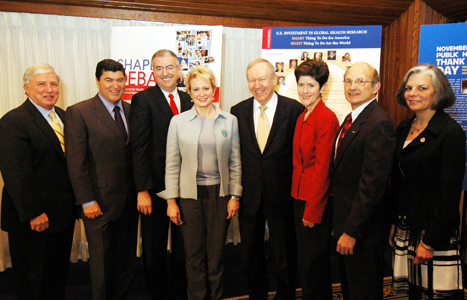2008 National Health Research Forum
Valuing Evidence-based Research and Enhancing its Impact
National Press Club, Washington, D.C.
March 18, 2008

Government and private sector health leaders, convening at Research!America’s annual National Forum, laid out a future of transformational change in which the best use of evidence-based medicine and technology will empower consumers to take more responsibility for managing their own health.
Panelist Carolyn M. Clancy, MD, Agency for Healthcare Research and Quality director, summed up the challenge: “It takes way too long to apply evidence in health care. There’s no question. We can do this (speed up application of evidence).”
Centers for Disease Control and Prevention Director Julie Louise Gerberding, MD, MPH, agreed, “The tragedy … is that it’s one thing to not know what to do … but an even bigger tragedy is to not do what we know.”
While the five top federal medical officials on the panel were circumspect about the political nature of health care reform, Research!America’s chair, The Honorable John Edward Porter, a former Illinois congressman, was blunt about the challenges facing evidence-based medicine.
“Clearly this administration has allowed science little place at its table and has put America’s great research engine at substantial risk. It has had a devastating effect on the science community, the researchinstitutions … and on young investigators and their families. It has slowed appreciably our move toward greater discoveries that can improve human health on this planet,” Porter said at the outset of the forum.
William D. Novelli, chief executive officer of AARP, perhaps the nation’s leading social marketer, said it will take voters turning their “angst into anger” to force politicians to make the tough choices required to base our health policies more soundly on evidence.
Research!America President Mary Woolley noted the importance of gauging public opinion on these issues: “Research can best serve the public interest when we know what the public is thinking, when we are able to answer questions raised by the public.”
Panel moderator Susan Dentzer, of the “NewsHour with Jim Lehrer” on PBS, asked participants to put themselves in the year 2030 and look back to assess what opportunities were lost due to the failure of the health care system to make full use of evidence.
Elias A. Zerhouni, MD, National Institutes of Health director, said the dilemma is that in many fields- medicine, economics and social sciences – evidence is collected but not disseminated because the research is divorced from policymaking “in a pattern of decisional gridlock, gripping society at large.”
He said while the solutions of 2030 are being developed now, “we have germinating seeds [of great discoveries] that are being essentially killed by the system … and there’s no amount of testimony or charm or anything we do that will change the fundamental physics (of) limitless entitlements and promises that essentially squeeze the degrees of freedom to do what you need to do, which is feed and fertilize the germinating seeds of successful experiments.”
Novelli, a public relations guru, anti-tobacco advocate and now head of one of the nation’s most powerful advocacy groups, said the biggest problem in health care today “is not at the bench but on the Hill.” He explained, “The American public is extremely worried … I feel it is AARP’s responsibility … to turn that angst into anger … When the middle class gets mad… the politicians listen.”
Zerhouni later observed, “It’s going to take fundamental redrawing of our political and policy decisional making processes” to achieve better health outcomes and more cost efficiency.
Novelli and Garry Neil, MD, Johnson & Johnson’s corporate vice president for science and technology, said advocates should make policymakers aware of the huge “returnon investment” from biomedical research.
“Congress is always thinking cost containment …and we need to figure out how to frame our arguments in cost containment ways,” Neil said. “We continue to see health care as a cost center and a cost driver; instead we should be seeing it as a productivity generator, as an engine for growth.”
Food and Drug Administration Commissioner Andrew C. von Eschenbach, MD, agreed, “Investments in biomedical research … are going to be the drivers of the economy in the next two decades. “He said advocates must argue, “This is not an appropriation-this is an investment in our present and in our future.”
Clancy noted that when Congress projects future health spending, “only a small part of that is demographics. A lot of it is misplaced spending in health care.” She said the challenge is “building a smarter delivery system that’s prepared to apply knowledge in a targeted way to the people who can benefit and to minimize harms.”
Joel Kupersmith, MD, chief research and development officer of the Department of Veterans Affairs, said transformational change will require “some sort of massive movement. … I’m not sure it’s likely to happen unless people start taking control of their own health care.” He forecast the formation of large advocacy coalitions developing around the issue of the electronic health record.
Gerberding predicted that when technology allows people better access to their own health records, “all of a sudden, we will have done what Quicken did for taxpayers 20 years ago “by allowing consumers “to make enormous decisions for themselves.”
Download an image-filled summary of the National Forum and 12th Annual Advocacy Awards Gala.




